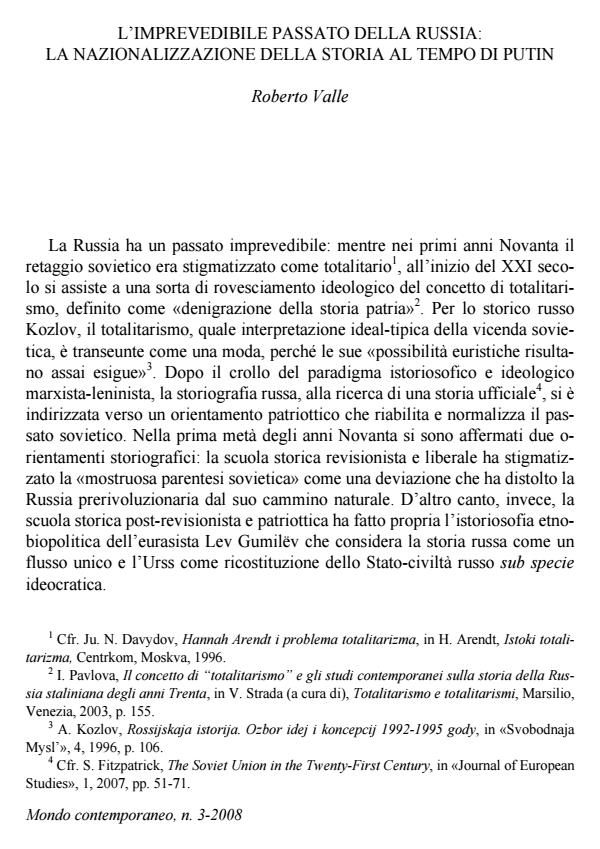L'imprevedibile passato della Russia: la nazionalizzazione della storia al tempo di Putin
Titolo Rivista MONDO CONTEMPORANEO
Autori/Curatori Roberto Valle
Anno di pubblicazione 2009 Fascicolo 2008/3
Lingua Italiano Numero pagine 16 P. 183-198 Dimensione file 209 KB
DOI
Il DOI è il codice a barre della proprietà intellettuale: per saperne di più
clicca qui
Qui sotto puoi vedere in anteprima la prima pagina di questo articolo.
Se questo articolo ti interessa, lo puoi acquistare (e scaricare in formato pdf) seguendo le facili indicazioni per acquistare il download credit. Acquista Download Credits per scaricare questo Articolo in formato PDF

FrancoAngeli è membro della Publishers International Linking Association, Inc (PILA)associazione indipendente e non profit per facilitare (attraverso i servizi tecnologici implementati da CrossRef.org) l’accesso degli studiosi ai contenuti digitali nelle pubblicazioni professionali e scientifiche
The Unpredictable Russia’s Past: the Nationalization of History at the Time of Putin - Russia has an unpredictable past: while in the early Nineties the Soviet legacy was condemned as totalitarian, the beginning of the 21st Century is witnessing a sort of ideological reversal of the use of the concept of totalitarianism, defined now as «denigration of the native land’s history». In fact the teaching of history focuses on the nationalist- patriotic paradigm, as shown by the examination of a contemporary history manual for teachers, Novej-aja istorija Rossii 1945-2006 gg. Kniga dlja ucitelja published in 2007. The manual does not include the former Soviet Union of Stalin in the wake of the legacy of the October Revolution, but in the political and cultural Russian tradition. In its secular history, the Russian state has affirmed its sovereignty by concentrating power in a single centre. Stalin was also the demiurge of the victory in the Great Patriotic War, that is one of the founding myths of the 21st Century Russian Idea: sovereign democracy. Consequently the manual places 1945 as the start of the contemporary history of Russia, giving to the Great Patriotic War a soteriological value of national and universal significance. The last chapter of the manual for teachers of history is an apology of the sovereign democracy, as a simultaneous nationalization both of the past and the future of Russia.
Roberto Valle, L'imprevedibile passato della Russia: la nazionalizzazione della storia al tempo di Putin in "MONDO CONTEMPORANEO" 3/2008, pp 183-198, DOI: